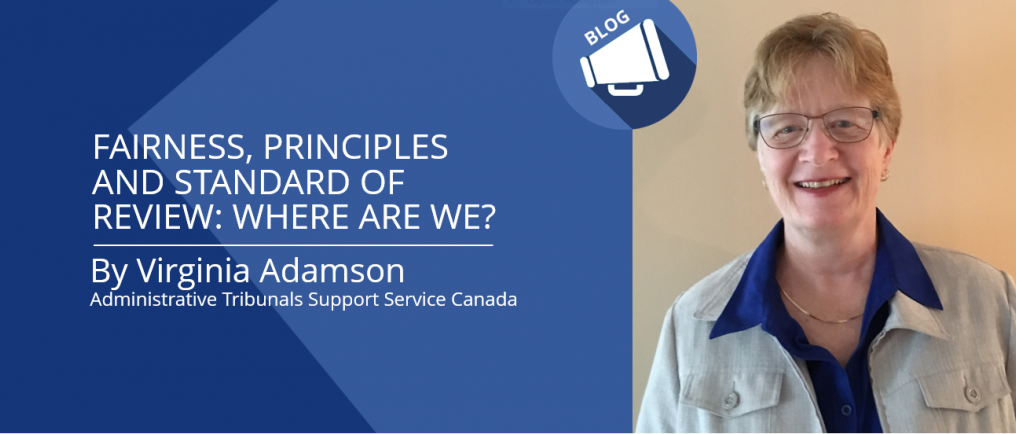Fairness, Principles and Standard of Review: Where are we?

A portrait of CIAJ’s National Roundtable on Administrative Law “These are the Principles, if you don’t like them, we’ve got others” (May 27, 2017, Vancouver)
The Canadian Institute for the Administration of Justice (CIAJ) organizes an annual Roundtable on Administrative Law that tackles a variety of seemingly unsolvable administrative law issues. These lively and engaging events ensure a variety of ways to deepen knowledge. This year’s event was equally engaging. As the Roundtable’s title says “tongue in cheek”, it is important to have a sense of humour in navigating administrative law idiosyncrasies.
Whether Dunsmuir v. New Brunswick, [2008] 1 S.C.R has advanced and solidified our understanding of judicial review was a discussion throughout the day, starting with opening words from Justice James O’Reilly of the Federal Court. Robert Danay’s fascinating study now published: “Quantifying Dunsmuir: An Empirical analysis of the Supreme Court of Canada’s jurisprudence on Standard of Review” observes that there is an apparent increase in deference to administrative decision makers post Dunsmuir. But there remain differing views on standard of review and – to paraphrase his paper – a never ending conflict over who gets the last word: the judiciary, the legislatures, the executive branch, or the administrative tribunal.
Should there be any doubt that “fairness” continues to be eminently variable, this was dispelled by the overview of recent practical cases in the area of procedural fairness and the right to be heard. In this highly informative presentation, Simon Turmel, Commissioner- Régie de l’énergie du Québec, reviewed recent cases on fairness pertaining to the duty to give formal notice, the duty to disclose relevant information, the duty to consider all relevant evidence, the duty of the court and the self-represented party, the duty to hear before deciding an issue, the duty to hear a motion to dismiss before proceeding to the merit, the right of representation by counsel and the duty to give reasons.
I very much appreciated the sharing of views on what constitutes the record. The panel on this issue was represented by lawyers in the private bar, experts, and tribunals- demonstrating the impact of administrative law on the ground and the importance of considering multiple and differing perspectives. Lauren Wihak and Benjamin Oliphant launched the discussion, advocating for a broader comprehension of the record (See their article, “Evidentiary Rules in a Post-Dunsmuir World: Modernizing the Scope of Admissible Evidence on Judicial Review“). Bob Nakagawa, Registrar for the College of Pharmacists of BC set out the ground work for the thinking processes of an expert agency, considering risk and mandate and other factors. Catherine Ebbs, Chairperson of the federal Public Service Labour Relations and Employment Board, returned to basic principles to get to the heart of the rules pertaining to the record, their exceptions, and when they may be difficult to apply.
The opportunity to work through various problems in roundtables – with members of the judiciary, lawyers, tribunal members, stakeholders in the administrative tribunal community and other interested stakeholders – provided another great way to deepen learning. There was engaged dialogue amongst all the round table participants. Kudos to Professor Sheila Wildeman for her background presentation and hypothetical. This was definitely part of what made that part of the day such a great success.
The Honourable Thomas Cromwell, now retired from the Supreme Court of Canada, offered candid observations about Dunsmuir and beyond. He questioned the accuracy of the assumption that the same tests and principles apply to all tribunals. Having worked within the federal and provincial administrative law for some time now, his reflections allowed me to re-anchor a term I had heard many years ago in the public sector: asymmetric horizontality. Tribunals may be on a continuum of agencies but they often reflect difference in what they do, given their diverse mandates.
It has been said that administrative law is not for the “faint of heart”. At first glance, its rules can be so fluid and adaptable that they are not easy to grasp, and potentially unpredictable in how they apply. Nevertheless, the CIAJ is fearless in organizing forums for discussion with high caliber expertise and thoughtful subject matter. For those who have not had the opportunity to attend, I would urge you to do so in the coming year! See you all in Ottawa on June 2, 2018.

